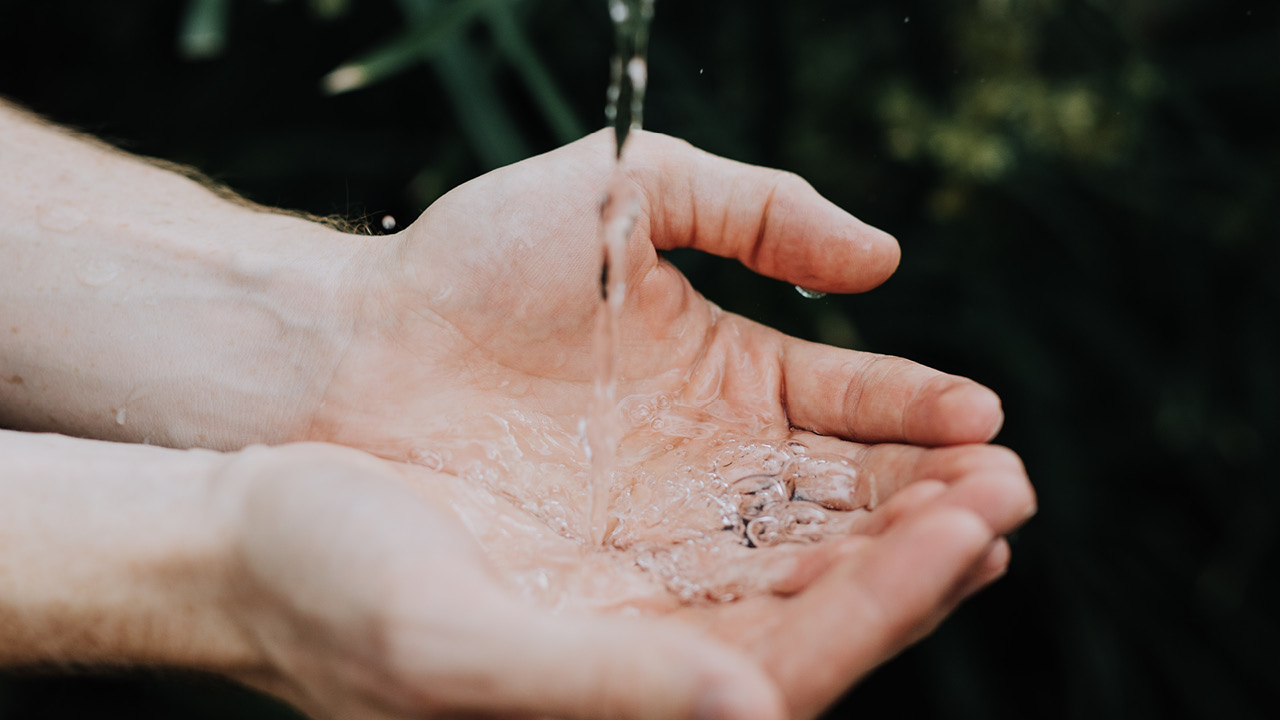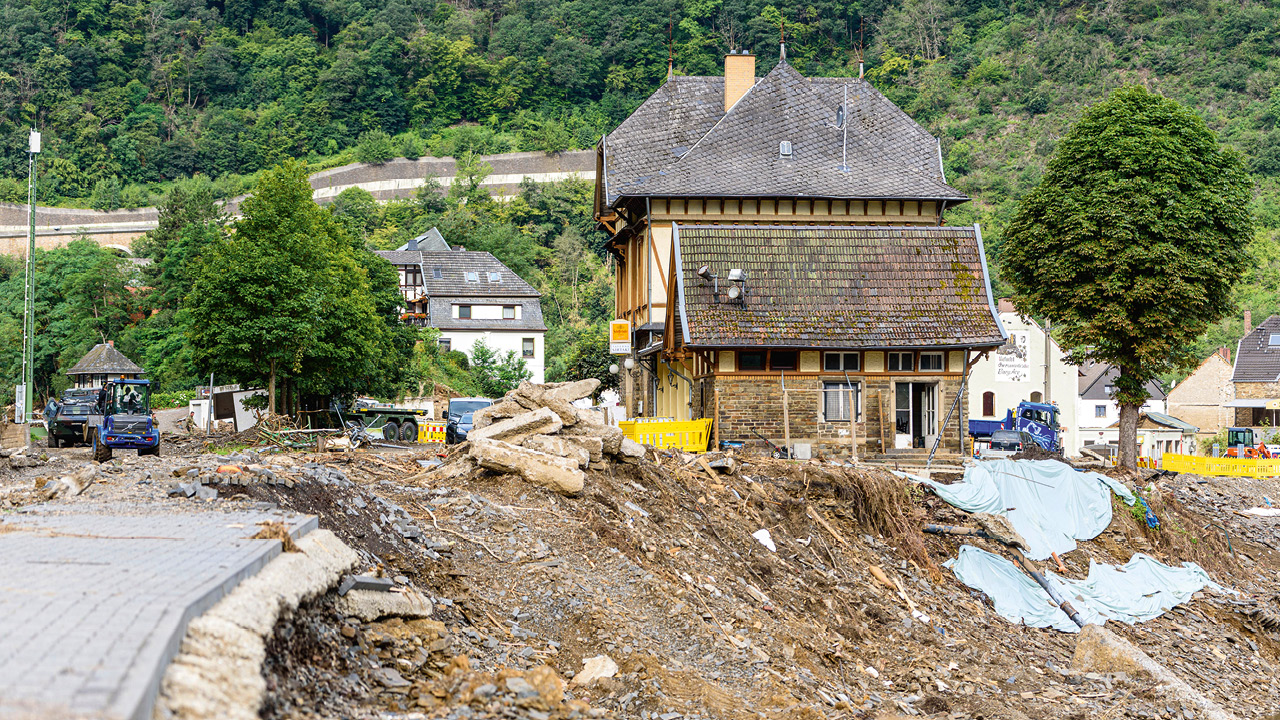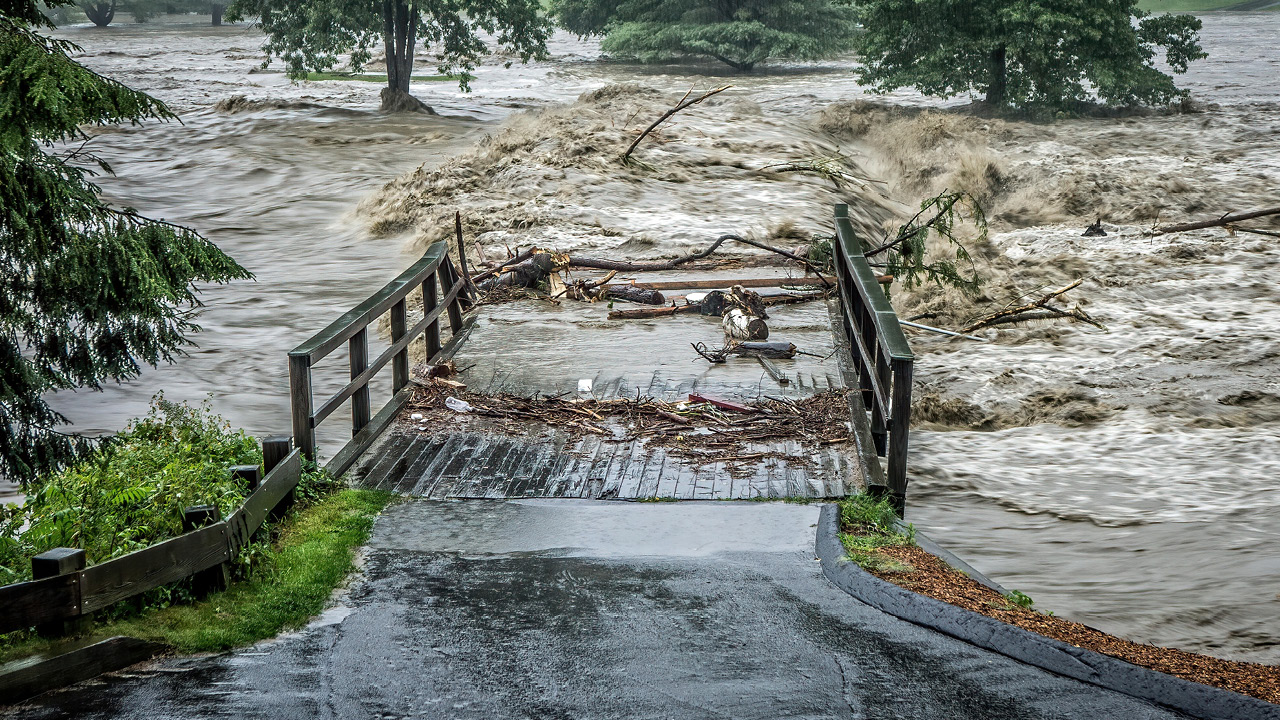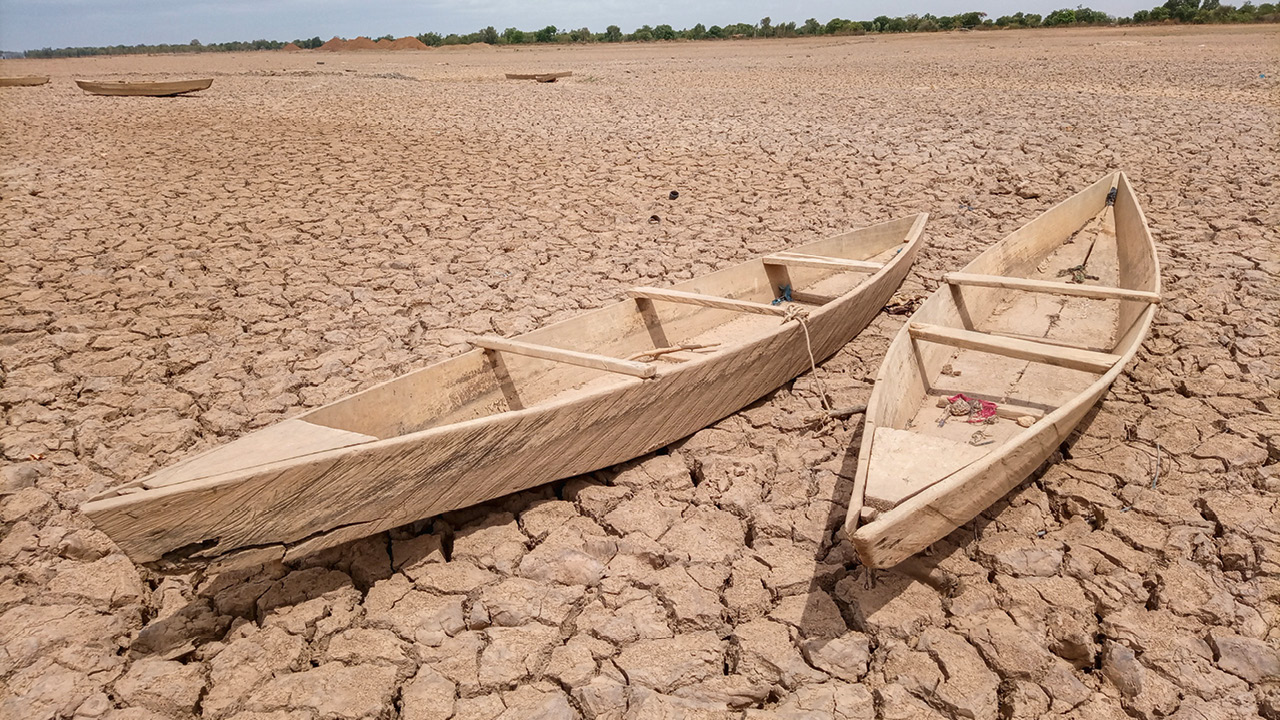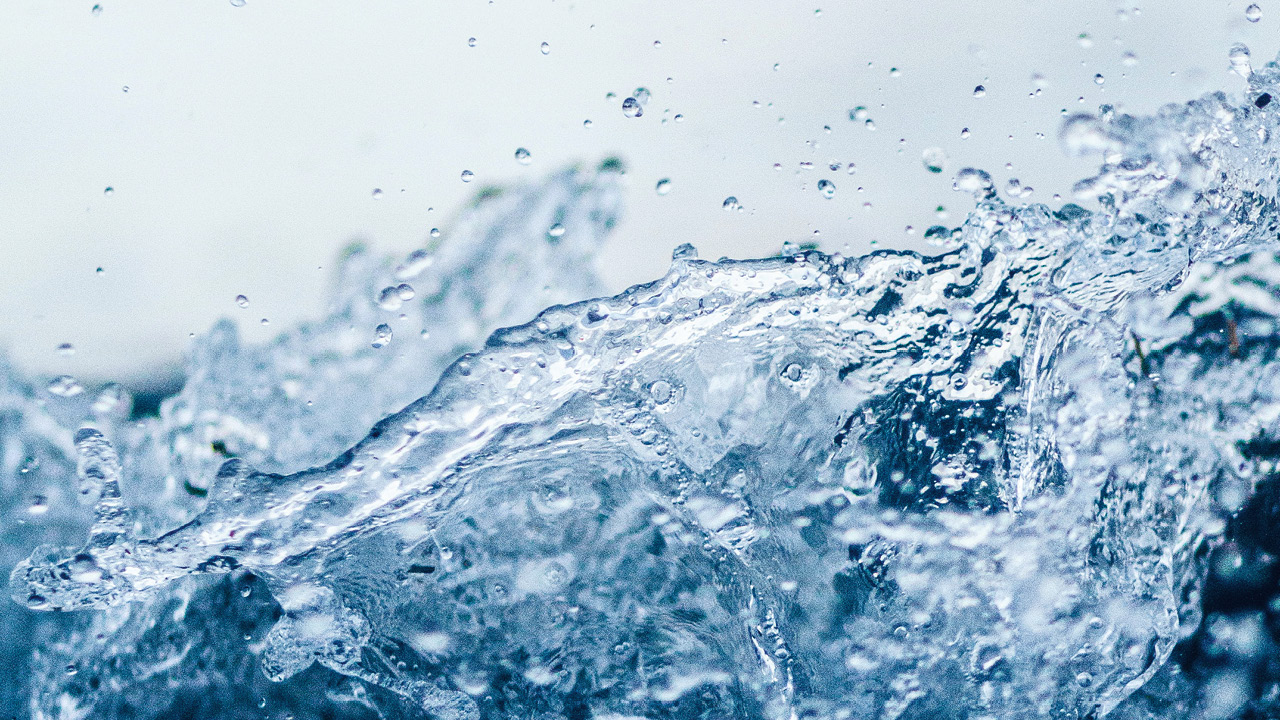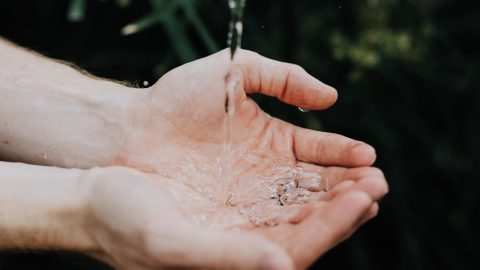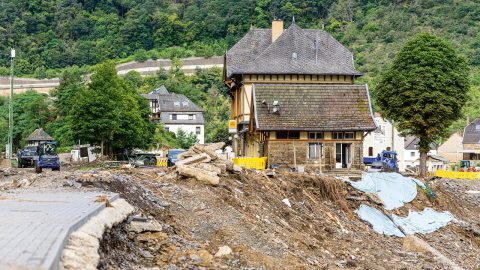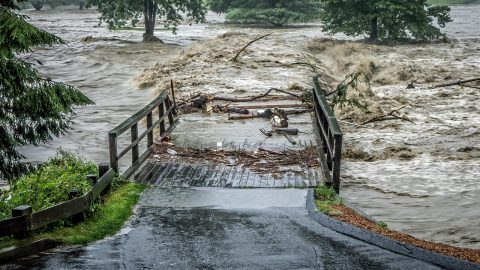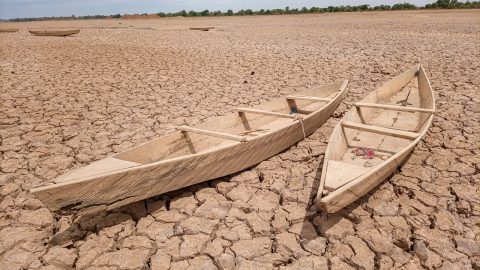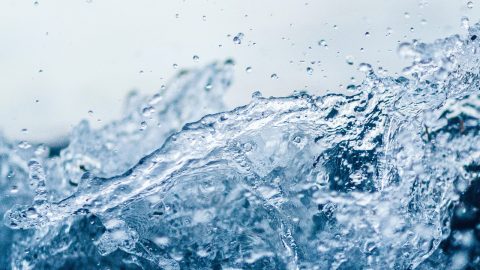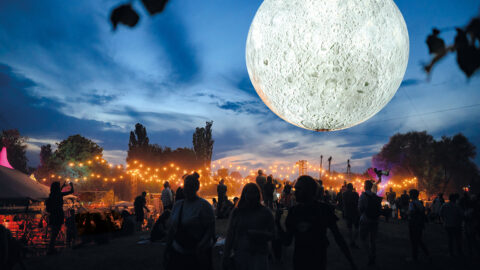Environmental art installation
Installation “Out of Balance”
Design and layout: Veronika Angloher
Ash wood figures: Adam Stubley
Voice direction and sound design: Matthäus von Schlippe
Water means life. Too much or too little water, however, brings destruction, suffering and death.
Images that have burnt themselves in: Water sweeps away everything, houses and bridges collapse. People have to leave their homes or can only be rescued by boat. This is what happened in July 2021 in the Ahr valley. Or: dried-up rivers and lakes with little water, the earth breaks up, plants dry up. A picture also on the Isar, Rhine, Lake Garda. Extremes in the form of drought or flooding take and destroy life. Too much water – as a result of heavy rainfall, for example – develops a force that changes whole swathes of land within seconds and washes away civilisation. Where there is no water, ecosystems are destroyed, food production collapses, animals die. People are forced to leave their homes.
The environmental art installation
The environmental art installation by Veronika Angloher and Adam Stubley shows the effects of water being out of balance. It confronts visitors with the consequences of drought and flooding. Affected people, who the audience encounters as abstract figures, movingly describe how their lives have been thrown out of joint by water in its extreme forms.
The Stories
drought
Corn farmer | USA
The harvest is gone. Everything has dried up. This is the worst drought I have ever experienced. It is painful to watch
everything wither away. All the work – days of tilling in the fields – all in vain. All the work in spring – for what?! Our fields lie fallow, lawns dry out, the forests look like a steppe and the maize cobs are tiny. My yield is hardly worth anything. Fortunately, I am insured for such situations in our country. Because without insurance, it would be a financial catastrophe for me and my family. With-out our harvest we can’t feed our live-stock, we can’t earn money from our yields. In addition, the prices of our products in the supermarkets are skyrocketing. the crop failure caused a price increase of maize by half! Our land has always been fertile and we always had good harvests. My grandfather used to say that. But now everything is
changing. The rain is unpredictable. You work and work, but you won’t get any-thing in return//get nothing in return, if there’s no water.”
Source: Deutsche KlimaStiftung: KLIMAFLUCHT exhibition
drought
Man | Greece
“I earn my living with olive trade//trading. I have my own olive farm. But the income is getting less and less because the
harvest turns out poorly//worse and worse. This is due to the rising tempera-tures and the drought. The heat is caus-ing more and more forests and fields to burn down. This has always been the case, but the fires are becoming more frequent and nature can hardly recover. I believe that climate change is to be blamed for everything. The heat waves and droughts are becoming more fre-quent and more severe. Almost every summer there is a lack of water and the soil is completely leached. In some places it looks like a desert. Almost all of Greece has seen a sharp decline in the olive har-vest due to the lack of rainfall. Where is this going to lead? Greece without olive cultivation is unimaginable!”
Source: Deutsche KlimaStiftung: KLIMAFLUCHT exhibition
drought
Woman with a child | Somalia
“So many of us died of hunger, almost 250.000 people. It was the worst drought in twenty years. We had no water and were so thirsty. Our cattle died. We couldn’t grow any more food and the little food that was left was getting more and more expensive. We were always hungry, so hungry. The drought got worse and worse. There are people who come here and say that climate change is making everything warmer, that climate change is also re-sponsible for the sandstorms. They are helping us to prepare for disasters and are working with us on how best to adapt to climate change. In the future, this should reduce the damage caused by disasters such as the terrible drought I experienced in 2011. It should also pro-tect us better. For example, we are now improving our Berkads, which are our traditional water catchment basins. In addition, we have water management committees in place to ensure that the facilities are well maintained and that there is access to water”.
Source: Deutsche KlimaStiftung: KLIMAFLUCHT exhibition
drought
Man | Ethiopia
“Our God must have gone mad. He doesn’t send rain anymore because peo-ple fight too much. I am Buruk Abebe and I live with my family – my wife and my son. So far, I have been working with my brother in the fields, bringing in the wheat, beating it out of the husks and peeling it. December is harvest time for us in southern Ethiopia.
We usually harvest 5,000 kilograms of wheat per year. This is enough to feed my family and to pay for the most neces-sary purchases like paraffin, school books and salt. At the end of the month, we usually celebrate thanksgiving in the whole village.
But today everything is different. It hasn’t rained for 18 months. For 18 months! No one can imagine that. The elders say it is the worst drought in 30 years. Our crops are destroyed. The water is running out. The cattle is dying. The radio says it’s cli-mate change. There had already been a severe drought in 2019. Then came the rain. An unbelievable amount of rain. The huge amount of water has left almost 200,000 people homeless.
Our life no longer takes place in the fields, but in our little mud hut. There we sow the most necessary plants, but it is hardly enough. There are 16 square me-tres of living space occupied by my wife, our two children and myself. There is nothing to do and nothing to celebrate. We owe it to international aid organisa-tions, that we are able to stay at all. This is no life!
Source: Exhibition KLIMAFLUCHT/ Deutsche KlimaStiftung, with the support of the LWL Museum of Natural History, Münster
Flooding
Woman | Nicaragua
” My name is Cynthia Rodriguez. I live with my family in Cocibolca, at Lake Nica-ragua. We live from fishing and agriculture.
[…]
The yield of our fields is our only source of food and income. But floods, heavy rains and unusually long dry periods are increasing. The village elders say this is climate change. And the consequences will become even more severe and directly threaten our existence. Hunger is becoming more and more a part of our daily lives, and growing coffee, one of our most important exports, is becoming increasingly difficult. We already have to fear for our crops on a regular basis. In addition, there are frequent hurricanes and cyclones. Hurricane Mitch, for exam-ple, 13 years ago, still hangs over our country like a trauma. It took the lives of so many people. Some of my relatives were among them.
But I am not afraid. We are strong peo-ple. Resilient. We have already endured and overcome a lot.
Climate change will change a lot, but we adapt. Remain flexible.”
Source: Exhibition KLIMAFLUCHT/ Deutsche KlimaStiftung, with the support of the LWL Museum of Natural History, Münster
Flooding
Woman | Bangladesh
„I am Munira Majumdar, my husband is a farmer. We love our land, but we are worried that we will soon lose everything. We are one of the countries suffering the most from
climate change. The sea is rising. Every day.
Irreversibly. My country will lose about 20% of its land area if the sea level rises by just one metre. A single metre. That’s as much as my son is tall today. It’s hard to imagine what the consequences will be.
Everywhere we feel the effects of climate change – if we don’t need water, we get too much, if we need it, we have too little. In addition, there are crop failures, soil salinisa-tion, uncertainties in society and conflicts in many places.
My mother observes how the monsoon cy-cles change and with them the flow of the rivers. These are our lifelines. We are particu-larly
dependent on the delta of Brahmaputra,
Ganges and Meghna. The delta is flooded more and more often. Salty seawater is seeping into the farmlands. This affects our
agriculture and fisheries. There are storm surges. Many people are losing their liveli-hoods. It is terrible.
In addition, there are riots in many places. People are fleeing.
Many people look the other way, stay in their comfort zone and hope that it won’t affect them in their lives. Everyone passes the problem on. Yet our problems are pre-dictable. Bangladesh is one of the countries most
affected by climate change.”
Source: Exhibition KLIMAFLUCHT/ Deutsche KlimaStiftung, with the support of the LWL Museum of Natural History, Münster
Flooding
Girl/young woman | Pakistan
“There were four long days between 27 and 30 July 2010 when the flood came. There was water everywhere. As much in a day as in half a year in some places. The rain flooded our house in the middle of the night. We screamed and ran for our lives. Everything was suddenly gone, nothing was left. No more home, no more possessions. And many of our neighbours and friends did not sur-vive. They say there were 2000 dead in total.
It was the worst flood disaster we have ever experienced in Pakistan. The floods sub-merged about one fifth of our country. 20 million people were affected. Half of them lived along the Indus River and had to flee.
Scientists do not agree on the reasons. Some say that the heavy rainfall is the result of a combination of several natural weather events. Others blame human impact, such as deforestation. They agree that the glaciers in the Himalayas are melting, floods will in-crease and many people will have to flee in the future. I too have fled. I miss my country and would have preferred to stay there. But there was simply no hope for me there.”
Source: Deutsche KlimaStiftung: KLIMAFLUCHT exhibition
Flooding
Andy Neumann | Germany, Ahrtal
„Our house was flooded tonight, in the abso-lute literal sense. And I, a grown man, a po-liceman, full of confidence, who can’t re-member ever feeling anything like fear since his late teens; I was scared to death! For my children, for my wife, and yes, even for my-self. Since we didn’t make it out, we were stuck on the first floor of our house, watch-ing our cars float away, other cars crash into our house, hearing the patio doors break open, seeing the piano go under, my moth-er-in-law’s beautiful paintings swimming in the mush, much of what was dear to us per-haps lost forever.
And the water rose and rose until there were only five steps separating it from the first floor. My incredibly brave wife and I carried up to the top floor everything that could be saved and seemed important. And then all you could do was wait. This helplessness, this “not being able to do anything”, is simply terrifying, at least for someone like me, who always prides himself on having a solution and an extremely cool head in every situa-tion.
There is a danger behind us that I would never have thought possible here, on this scale. And whether it is a direct effect of climate change or not, I ask you only one thing: let’s not take the chance!”
Source: Neumann, Andy: Es war doch nur Regen. Protokoll einer Katastrophe,2021, Meßkirch, p. 19ff.



